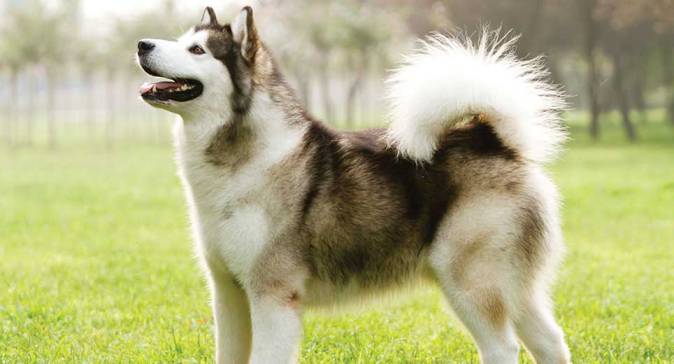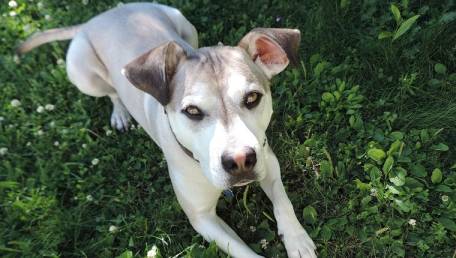Have you heard of the Pitsky and would you like to adopt one? Or are you wondering exactly what a Pitsky is? If so, then you’ve come to the right place!!
Connect with a verified veterinarian in minutes. Licensed vets are available 24/7 to answer your questions. No need to worry about your furry family member.
We’ve put together the information you need to make an informed decision on whether or not to adopt one of these beautiful dogs. You’ll learn what a Pitsky is, their characteristics & personalities, and more. Let’s get started!
What is a Pitsky?
A Pitsky is a cross between a purebred American Pit Bull Terrier and a purebred Siberian Husky or an Alaskan Husky. When you cross breed these dogs the result is a litter of Pitsky puppies! A Pitsky, as a cross bred dog, is a mix of their two parents.
Because their genes come from two parents from two different dog breeds, the resulting mixed puppies will have a mix of their parents’ traits. For this reason, there’s no way to determine exactly how the puppies will look, how their personalities will develop, etc. Each puppy will be its own unique, beautiful combination of the parents!
Pitskies are known for being extremely loyal, intelligent, and have a love and need of getting plenty of exercise. If you love a Pitbull or a Husky, then you’ll fall in love with the Pitsky!
Pitsky Characteristics
As we noted earlier, no two Pitskies are alike, even from the same litter. Each is a unique bundle of canine love! No one is really sure when breeders first began breeding Pitsky puppies, but it’s thought they started about 20 years ago, at the height of the “designer” dog breeding programs.
Pitskies generally weigh in between 35 to 80 lbs, and they stand between 19-24 inches. They have a life expectancy of about 12 to 15 years. And these mixed dogs come from working parents—this is important to understand, but we’ll talk about that later.
Remember that Pitbulls come in a wide range of colors and patterns. These include:
- Red
- White
- Brindle
- Fawn
- Seal
- Sable
- Blue
- Black
- Bronze/brown
- Liver
Huskies also come in a range of colors including:
- Sable
- White
- Gray
- Red
- Brown
- Agouti
- Black
The mixed puppies of a Pitbull and a Husky can be any combination of these colors/patterns. No two will be alike! Pitskies may develop to look more like their Husky parent, or the Pitbull parent. For this reason, they may have more the stocky build of the Pitbull, or more strongly resemble the Husky.
Their fur, too, can be short/stiff, or fluffy/soft. If you have a Pitsky with long, fluffy fur, they will do better in areas that have cooler temperatures. On the other hand, Pitskies with short, stiff fur will do well in warmer climates.
When it comes to their eyes, you may have a Pitsky with brown or blue eyes, or one of each! Your fur baby may have floppy ears, or those that stand up—either way they’re darling!
Remember we mentioned earlier that Pitskies come from parents who come from two working breeds. Their puppies are also geared to working, which should come as no surprise! Pitskies are extremely energetic dogs! They’re also very athletic.

Review symptoms, medications & behavior to keep your pets healthy with a Vet Online in just minutes.
Ask a Vet Live NowPitsky Personality
We’ll get this out of the way now—Pitskies are not good candidates for apartment living. This is because they are extremely energetic and smart. These dogs also are best suited to families who are high-energy and out and about. You’ll need to be an active pet parent, as your Pitsky will need a lot of exercise, with the emphasis on “a lot.” In addition, these dogs need pet parents who are in firm control, as Pitskies have a tendency to be strong-headed and stubborn.
Pitskies also tend to be difficult to train, and this is another reason they need a pet parent who is experienced and can provide strong leadership. Consistency is needed when training these dogs. Pitskies also require proper socialization, which needs to start when they’re puppies.
Pitskies are also known for being extremely loyal dogs; for this reason, they’ll require lots of attention. If you work away from home for long hours, a Pitsky will suffer from separation anxiety. This generally leads to unwanted behaviors such as becoming very anxious or destructive. So, if you can’t be with your Pitsky most of the time, then it’s best to consider another type of dog.
Pitsky Health Problems
Pitskies can have a tendency to suffer from the following medical issues:
- Hip dysplasia
- Skin/coat allergies (including Demodex mites)
- Cardiac disease
- Hyperthyroidism
- Cerebellar ataxia
- Follicular dysplasia
- Juvenile cataracts
While these health issues are the most common in Pitskies, your fur baby may be very healthy and not develop any of these medical problems. Most dogs will not develop all of these conditions, though they could suffer from one or two.
Care of a Pitsky
A Pitsky will need plenty of exercise, which means quite a bit of exercise. These dogs love to play, run, hike, pull, and more! The more exercise and time you spend with your Pitsky, the better.
Your Pitsky will love nothing better then to join you on a jog, long walks (60 minutes, but more is better), and more. Having a large, fenced yard is also necessary, so your fur baby can get out and play when he’s full of energy.
In addition, they need mental stimulation to keep from being bored, so obedience training can help with their mental wellbeing.
When it comes to diet, a Pitsky needs anywhere from 600-1400 calories a day, depending on his age, size and energy levels. The larger the dog, the more calories he’ll need, which translates into a lot of dog food.
Pitskies tend to shed most of the year, so you’ll need to be prepared to be covered in dog hair, and vacuum quite a bit. Your fur baby will also need to be brushed at least once a week, but more often during the two main shedding periods of spring and fall.
And Pitskies don’t need to be bathed more than once a month, unless they’ve become pretty dirty and stinky.
Summing It Up
Pitskies are extremely loyal dogs, who want to be with their pet parents most of the time. Otherwise, they can develop separation anxiety that leads to destructive behaviors. These dogs need pet parents who are able to provide strong, consistent leadership.
These dogs are also extremely playful and energetic! So, they need pet parents and families that are also extremely active. They’ll be your best bud, if you’re the right type of pet parent for these lovely dogs!
Connect with a verified veterinarian in minutes. Licensed vets are available 24/7 to answer your questions. No need to worry about your furry family member.

Tom
Tom has always loved to write since he was little - he wanted to be either a writer or a veterinary doctor, but he ended up being a professional writer while most of his works are based on animals. He was born in San Francisco but later moved to Texas to continue his job as a writer. He graduated from the University of San Francisco where he studied biotechnology. He is happily married and a soon to be father!
Review symptoms, medications & behavior to keep your pets healthy with a Vet Online in just minutes.
Ask a Vet Live Now



